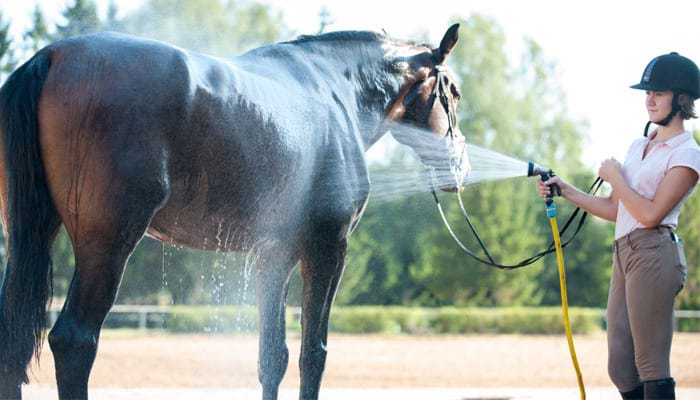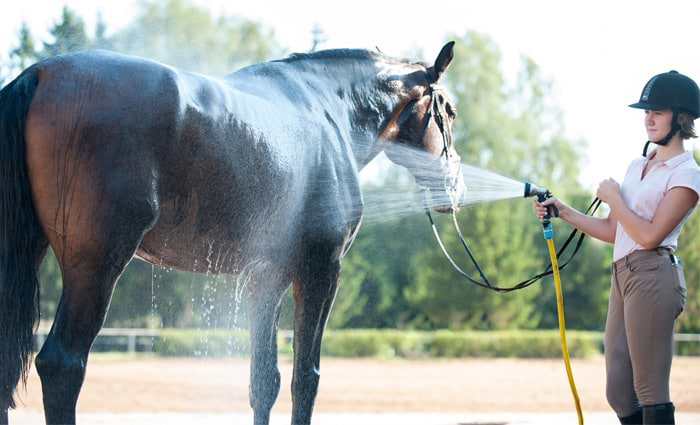
Summer is traditionally a hectic time for horse owners - it's the season for horse shows and trail riding and a time to enjoy the long, sunny days with your four-legged friend. However, remember, the hot weather means you must take extra precautions to ensure your horse is happy and healthy.
Keep your rides safe and fun, for both you and your horse, by following good practices when the temperature starts to rise. When the weather gets hot, so does your horse - very quickly. This can lead to heat exhaustion if you're not careful.

© AnnaElizabeth / Adobe Stock
Heat exhaustion
A horse's body temperature can rise to more than 104°F faster than you would think, especially when exercising in heat and humidity. If your horse is overweight, not particularly fit, is heavily muscled, or has a dark coat that absorbs the sun rather than reflecting it, overheating is a bigger risk.
If your horse shows signs of being overheated, it's important to act fast, as this can lead to heat exhaustion - a potentially fatal condition. Look out for the symptoms, which may start with restlessness and lethargy.
Don't mistake this for being normal behaviour due to the heat, as it's quickly followed by a rapid pulse and heavy breathing and panting, accompanied by excessive salivation. As the horse's temperature rises further, their heartbeat can become erratic, followed by muscle spasms, a stumbling gait and collapse.
Before your horse reaches this incredibly dangerous state, find a shady spot and douse him with cool water. Use a scraper to remove excess amounts from the skin and continue doing so until his temperature drops to a maximum of 101°F and ideally lower.
Hydration
One way of helping to keep your horse safe in hot weather is to make sure he's properly hydrated. Horses need a minimum of five gallons of water each day in normal weather conditions. This can double and even triple in the summer, especially if the horses are active in the hot weather.
If you're travelling, always take water from home on your trip. If your horse becomes very hot, or seems exhausted, give one gallon of water every 15 minutes until he refuses to drink any more.
Electrolytes, which are salts and minerals, can help to encourage water consumption in horses and will replace losses through sweating. Have a chat with your vet about the correct dose and frequency of electrolytes. Offer your horse unlimited water after giving electrolytes.
Sufficient rest
When your horse is travelling, he's likely to move around, shifting weight from foot to foot, due to the motion of the vehicle. They can expend energy that is almost the equivalent of walking, so if you're on a six-hour journey, it can be the same as a six-hour ride for a horse.
If you have a long way to go, don't expect your horse to be feeling as fresh as a daisy on arrival. Give yourself enough time for a few hours' rest before an event - or even better, arrive the night before. If the weather is hot when you're travelling, leave all the vents and windows open, to avoid the risk of your horse developing "shipping fever".
The stress of the journey can affect the horse's immune system, which can cause a cough or fever. This can be serious if left untreated, so call the vet immediately if your horse develops any symptoms after a long journey.
Sun protection
Always remember that horses, like people, need sun protection in the summer. In particular, horses that have pink around their eyes or muzzles can suffer from sunburn. It's generally safe to use sunscreen for people on your horse, as long as it doesn't contain para-aminobenzoic acid.
If horses with pink skin around their face are exposed long-term to ultraviolet rays, this can leave them prone to cancer, so a UV-blocking fly mask should be used.
First aid kit
Another useful tip is to keep a well-stocked first-aid kit in your horsebox and stable. You should also take a smaller first aid kit on trail rides.
Have a chat with your vet about dispensing prescription anti-inflammatory medication, such as flunixin meglumine or phenylbutazone. Make sure you know the correct dosage and frequency. Every spring replace any out-of-date items in your horse's first aid kit.
Taking good care of horse and rider
If you take the necessary precautions, summer can be a wonderful time of year, for both you and your horse.
Griggs Equestrian supplies a comprehensive range of equestrian products. Visit us in person at our Cornwall store, where you'll receive a warm welcome, or browse our website.





